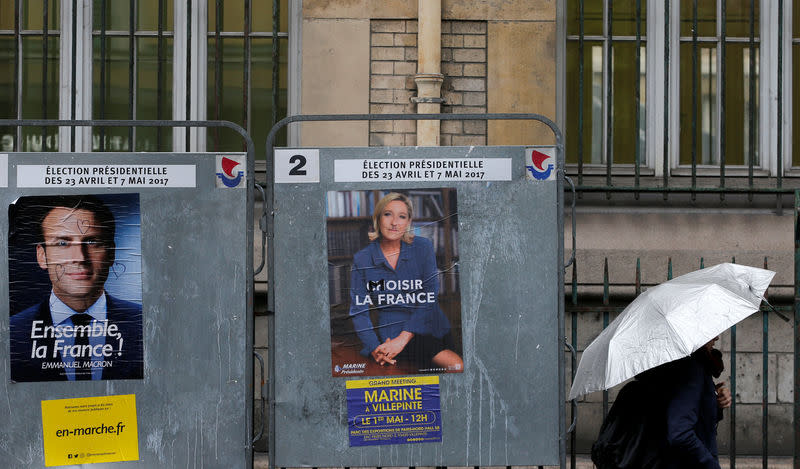EU readies united Brexit front, bets on Macron

By Padraic Halpin
DUBLIN (Reuters) - European Union leaders may have feared the worst for 2017 but in the coming days they can demonstrate a united front on Brexit, watch the bloc's economic recovery strengthen further and likely avoid an electoral earthquake in France.
In a year laden with potential risks, Europe has so far cleared an electoral hurdle in the Netherlands, produced a string of mainly positive economic news and put pressure on the European Central Bank to end its massive monetary stimulus.
Leaders of the 27 remaining EU member states will cap off four months that have proven more stable than they could have imagined by formally adopting negotiating guidelines for their break-up talks with Britain at a summit on Saturday.
Ministers in charge of the Brexit talks made no changes to draft guidelines on Thursday, indicating few major differences had emerged, at least for now, one month after Britain triggered the two-year divorce procedure.
The united EU front hinges on France's presidential election. Most member states have made no secret of their hope that Emmanuel Macron, a pro-EU centrist, will beat eurosceptic far-right candidate Marine Le Pen.
Macron is the overwhelming favorite in the May 7 run-off and holds a wide lead in polls that proved accurate in the first round, although two surveys since have suggested Le Pen made a more impressive start to the last lap.
"As a pro-European, he would maintain the Franco-German alliance and bring some renewed optimism to the European project, which has seemed unstable over the past year," said Lars Lundqvist, an economist at Roubini Global Economics.
"Our base case is that Macron will win."
Between the two main political events, a busy week of data will provide a flash estimate for first quarter euro zone economic growth, unemployment figures for March and Purchasing Managers' Indices for April.
The latter more timely surveys for the manufacturing and services sectors come as economic sentiment across the 19-member euro zone climbed to a near 10-year high in April.
Economic growth is expected to be steady at 0.4 percent on Wednesday and remain at that level through the third quarter of next year, according to a Reuters poll of economists.
Data on Friday appeared to broadly back that up with weaker-than-expected gross domestic product expansion of 0.3 percent in France offset by booming 0.8 percent growth in Spain.
FED ON HOLD
In the United States, the main event arguably comes at the end of the week with April payrolls that may tell more about the Federal Reserve's next move than a meeting of the board itself on Wednesday where no change in policy is expected.
After raising its benchmark interest rate once this year, by a quarter percentage point at its last policy meeting in March, the median Fed policymaker forecast is for two more rate increases by year-end.
"Ahead of the March rate hike, the Fed left it relatively late before it gave a very explicit steer that it was on course to tighten policy at that meeting," Victoria Clarke, economist at Investec, said.
"If the Fed works of this basis again, it may be that the Fed statement next week leaves its options open on the June meeting without giving an explicit steer."
With no news conference due this time, speeches two days later by Fed Vice Chair Stanley Fischer and San Francisco Fed chief John Williams will be watched for clues on any move in June.
Recent weaker-than-expected readings on domestic growth, inflation and retail sales have reinforced the view that the U.S. economy slowed in the first quarter, although economists at Commerzbank said they expect Fed officials will probably dismiss these as statistical outliers.
"The U.S. central bank remains on course for monetary policy normalization," Commerzbank Bernd Weidensteiner said, anticipating two more rate hikes this year.
Other rate decisions of note in the coming week will be made in Norway, the Czech Republic and Australia, while Chinese PMIs will also provide a health check of the world's second-largest economy at the start of the second quarter.
(Editing by Janet Lawrence)

 Yahoo Finance
Yahoo Finance 